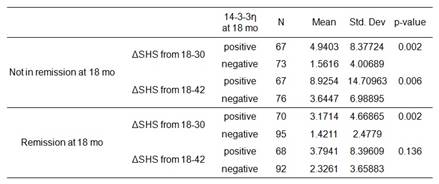Session Information
Session Type: ACR Poster Session A
Session Time: 9:00AM-11:00AM
Background/Purpose: Advancements in RA treatment
approaches with DMARDs and biological agents have enabled disease remission
goals that were previously considered unattainable. The concept of "tight
control" strategies tailored to individual patients defines specific
clinical targets for DAS remission, reduction of CRP and ESR to normal measures
and the halting of joint damage within a reasonable time frame. 14-3-3η is
normally a ubiquitous intracellular protein that in RA, is released into the
extracellular space where it acts as a ligand that potently induces MMPs, RANKL
as well as TNFα and IL-6. 14-3-3η is available as a highly specific
diagnostic blood test for RA and is modifiable over the disease course, lending
itself well to serial testing for disease monitoring to healthy, negative
levels. The aim of this study was to examine
whether seroreversion of 14-3-3η to negative levels at 18 months is
associated with a better radiographic outcomes at 30 and 42 months in RA
patients.
Methods: Serum 14-3-3η levels were
measured at baseline (BL) in 331 patients with recent onset polyarthritis
(Sherbrooke EUPA), in which tight control was applied and 60 months follow-up
completed. 14-3-3η positivity was defined as ≥0.19 ng/ml. Mean age
was 60 years, 62% were female, and median (IQR) duration of symptoms was 4
(1.7-5.7) months. At 18 and 30 months, radiographic follow-up data was
available for 320 and 310 patients, respectively. ANOVA analysis was performed
to assess the significance of differences in radiographic outcomes from BL to
18 months based on 14-3-3η positive status at BL and 18 months. DAS
remission at 18 months was defined as <2.6. Differences in mean ΔSHS from
18 to 30 and 42 months based on 18 month 14-3-3η positivity was assessed
using the Student t-test.
Results: Out of 320 patients, 147 (46%)
patients were 14-3-3η positive at BL. At 18 months, 126 (86%) remained
positive (RP) and 21 (14%) became negative (BN). Of the 173 (54%) that were
negative at BL, 154 (89%) remained negative (RN) and 19 (11%) became positive
(BP). In evaluating radiographic progression from BL to 18 months, ANOVA
analysis revealed that the mean (SD) ΔSHS was lowest in those patients that
BN for 14-3-3η [2.7 (3.9)] or RN [2.5 (4.8)] versus patient groups that RP
[4.3 (5.7)] or BP [6.0 (10.5)], p=0.009. Sub-grouping of patients according to
DAS28 remission revealed despite achieving a DAS28 <2.6, patients that were
14-3-3η positive at 18 months had significantly higher ΔSHS from 18
to 30. Similar observations were apparent in non-remitters (table).
Conclusion:
Patients with early
polyarthritis who are 14-3-3η seronegative and remain negative or revert
from positive to negative levels at 18 months, have less radiographic
progression at 30 and 42 months. Aiming for negative 14-3-3η levels as
part of treat-to-target strategies may assist clinical efforts to halt joint
damage progression.
To cite this abstract in AMA style:
Boire G, Carrier N, de Brum-Fernandes A, Liang P, Masetto A, Gui Y, Savill J, Michienzi S, Ménard H, Maksymowych W, Marotta A. In Early Undifferentiated Polyarthritis, 14-3-3η Seroreversion or Sustained Negativity Is Associated with Better Radiographic Outcomes, Even in DAS-28 Remitters [abstract]. Arthritis Rheumatol. 2015; 67 (suppl 10). https://acrabstracts.org/abstract/in-early-undifferentiated-polyarthritis-14-3-3-seroreversion-or-sustained-negativity-is-associated-with-better-radiographic-outcomes-even-in-das-28-remitters/. Accessed .« Back to 2015 ACR/ARHP Annual Meeting
ACR Meeting Abstracts - https://acrabstracts.org/abstract/in-early-undifferentiated-polyarthritis-14-3-3-seroreversion-or-sustained-negativity-is-associated-with-better-radiographic-outcomes-even-in-das-28-remitters/

